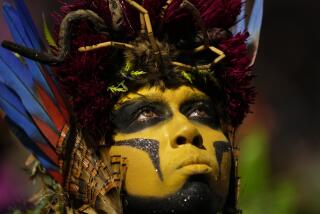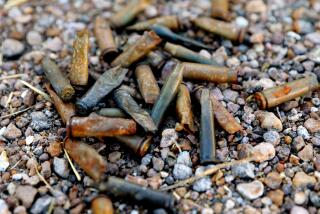Avon Is Calling, and It’s a Jungle Out There : Brazil: Women find independence doing big business in the Amazon.
- Share via
PATROCINIO, Brazil — Elisa Maria Rodrigues doesn’t ring her customers’ doorbells, because in the middle of the Amazon jungle there aren’t any. Many times there aren’t even any doors, just stick-frame houses covered with big, black plastic tarps or dried palm fronds.
Still, as she and thousands of Brazilian women like her make their way across rivers, down dusty roads, up hills and through swamps to the homes and habitats of gold miners, prostitutes, farmers and others trying to scratch out a living, the refrain is one familiar to Americans for about 30 years.
“It’s the Avon lady.”
Every day in Brazil, a small army of women armed with Bart Simpson deodorant and Eros and Topaz colognes spread out through the world’s most dense vegetation, hawking their wares in remote places like this mosquito-infested gold-mining camp and scores of other small towns and villages accessible only by water or air.
In canoes, on riverboats and aboard small, propeller-driven aircraft, they venture to the unlikeliest places, selling products to the unlikeliest of people and with the most surprising results--tens of millions of dollars in sales. For Avon, this Amazon sales force, which is beginning to take on legendary proportions and is even being considered as the subject of a major motion picture, has proven an unexpected boon.
Last year, Avon’s Amazon sales force accounted for $70 million, 15% of the company’s $465 million in sales nationally. Brazil is now the largest single market outside of the United States for Avon, which recorded $3.8 billion in sales worldwide in 1993.
“The economists thought we were crazy to go to the Amazon, and they’re right if you analyze the economic indicators,” said Avon Brazil’s president, Ademar Serodio. “People (there) live in places where there are no banks, no infrastructure, no major employers and payments are made through bartered goods.”
Avon discovered, however, that it was exactly for those reasons that it was successful. The company’s flexible system allowed representatives to be paid in chickens, eggs, gold, fruit, vegetables or services. And because these remote communities were so cut off from commerce, they contained the pent-up demand of potential consumers who wanted to look and smell good.
“Everybody thinks a miner is like an animal,” said Juarez Araujao Limas, 36, covered with rust-colored dirt as he tried to wrestle grams of gold out of the ground in the sweltering heat of Patrocinio. “But we’re normal people who want normal products like everybody else. Nobody likes to get next to a good-looking girl smelling bad.”
They’d better not, said Eliene da Silva Costa, a 20-year-old prostitute and Avon customer in one of the four brothels that serve Patrocinio.
“When a guy is smelling, we send him away,” Costa said.
While the Amazon market, growing at 50% annually, has been a huge plus for the world’s largest cosmetics company, it has been an even greater blessing to the company’s 42,000 regional representatives, part of Avon Brazil’s 400,000-strong national sales force.
In a country where the vast majority of women are confined to menial jobs, particularly in undeveloped rural areas, the opportunity to work independently in a more professional setting has been as much a psychological as economic boost for thousands of women. It has awakened in them abilities that many did not know they possessed.
“Women who had nothing are learning for the first time to be independent, that they can have control of their lives,” said Maria das Gracas Gomes, 44, who manages 1,000 sales representatives in an Amazon area slightly larger than Austria. “They learn to relate better to other people, to find (their) own place in society. It was the same thing I discovered in myself--that I was capable of doing things that I didn’t think of before.”
These saleswomen, who operate entirely on a 30% commission, make $250 to $700 a month--figures far above the regional average and in many cases higher than the national average.
But it is a tough way to make a living.
Traveling through the region is difficult at best. The saleswomen must venture down treacherous rivers to pick up products and make deliveries. Periodically, boats capsize and representatives lose their products, and sometimes more.
Last month, three people were killed and one Avon representative barely survived when their small boat went over a waterfall after the boat lost its engine as they were venturing upriver to make a pickup.
And bandits are always lurking, so salespeople go in armed. Three Avon representatives have been robbed and killed.
The most dangerous areas are the rough-and-tumble mining camps, places like Abacaxi or Castelo de Sonhos (Castle of Dreams), which resemble a scene from a Clint Eastwood Western. Almost weekly, one of the camp’s many pistol-packing miners ends up dead after a saloon brawl or an argument over a mining claim.
There is also constant concern about malaria. “Nobody who stays there for a week escapes malaria,” said Rossimar Pareira da Silva, 39, who makes deliveries to the camps for his wife because of the dangers.
But in the secluded mines, people pay higher prices and they pay in gold. “That’s why sometimes the sellers take the risks,” Da Silva said. “You get the gold, and then you resell it.”
Women like Fatima Vasques are willing to take the risk. Vasques, 28, began selling Avon four years ago, not long after her husband, a pilot, was killed in a plane crash. A housewife since age 15, she was left with an 8-year-old son, a 2-year-old daughter, little education and no working experience. Life as a poorly paid maid, she said, seemed her only option.
But today she makes $300 a month, nearly twice as much as a beginning schoolteacher in Rio de Janeiro. She no longer goes door to door or ventures into the mining camps--she has her own network of women to do that. She rents space at the local airport, where she sells Avon and other products.
“And right now, I’m in the process of opening a small store,” she said, sitting outside a restaurant in Itaituba, a small river city that serves as a supply center for many of the gold-mining camps.
Her success with Avon, she says, has brought about a personal awakening that has led her to other business ventures. When Vasques strides through town these days, people address her as “Dona” Fatima, a Brazilian title of respect.
Award-winning screenwriter Jane Anderson, an American who lives in Los Angeles, said she saw such change repeatedly as she toured the countryside talking to saleswomen in preparation for a script she would write about them for MGM/Universal Pictures.
“When I first got the project, I said to myself, What is this--exploitation of these women by a corporation?” said Anderson, who wrote the television movie “The Positively True Adventures of the Alleged Texas Cheerleader-Murdering Mom” and the current feature film “It Could Happen To You.”
“But I was deeply, deeply impressed (with) how this dinosaur of a product has done more for feminism in Brazil than anything. I saw women who had achieved a degree of independence, of dignity, who had been able to create for themselves a wonderful life.”
Avon Brazil President Serodio says that has been one of the most rewarding parts of the Amazon project.
“It’s incredible to see a woman who for years was told that she was nothing, who has had almost nothing and then coming back and believing in herself.”
“All I can say is, ‘Thank God for Avon,’ ” said Maria do Carno da Silva Gomes, beaming as sunlight streamed through the space between the boards of her home.
Gomes, 36, began selling Avon cosmetics shortly after she and her family of six moved 4 1/2 years ago to Itaituba, where her husband had planned to open an auto repair shop. The shop failed and Gomes, who had never held a job, turned to Avon to help feed her family of six. Now, she makes nearly double her husband’s $180-a-month wage as a city auto mechanic.
“His salary is tiny,” Gomes said, squeezing two fingers together to illustrate her point. “He’s sometimes jealous that I make more money, but I think he’s very grateful that I’m able to help out.”
Gomes picks up her cosmetics at a local drop-off point in Itaituba after they come downriver by boat from Santarem. She then heads off to shops and communities in the surrounding area.
In a local agricultural community, farmers pay her in rice and chickens, which she either keeps or resells for cash. Periodically, she wraps up packages for the gold miners, marking each bundle’s price as one, two or three grams of gold.
The packets are passed on to another woman, who hitches a ride downriver and takes a small boat to a mosquito-infested mining camp.
Selling, ordering and accounting for the supplies, Gomes said, has made her a “businesswoman”--a title she relishes--and given her a cherished independence. “When you don’t earn your own money, you have to ask your husband for the money,” she said. “When people earn money, then they can buy presents and things for whomever. It is a marvelous feeling.”
Last November, she bought a car, a 1980 Volkswagen Beetle--even though she doesn’t know how to drive. It is mostly her husband who uses the car, but Gomes and her 14-year-old daughter often go to the dirt road in front of their small wood-frame home and try to teach each other the mechanics.
Gomes said she thinks that her children, three girls and a boy, will benefit from her personal evolution.
“I hope that my children can learn that they can have control over their lives,” she said. “They can look at me and see that they have ability, that they are capable.”
More to Read
Sign up for Essential California
The most important California stories and recommendations in your inbox every morning.
You may occasionally receive promotional content from the Los Angeles Times.













